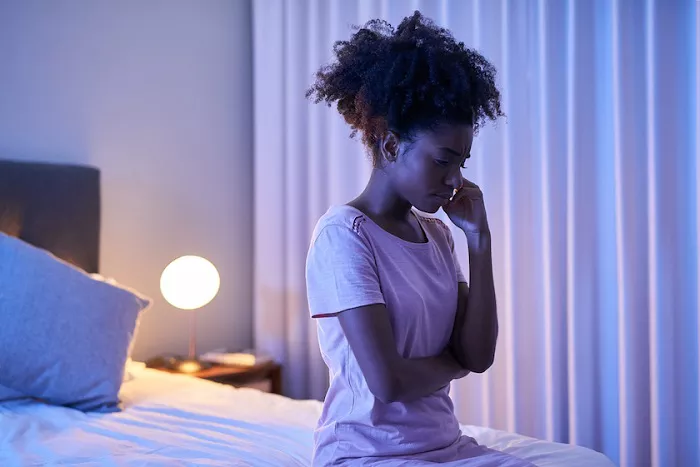Sleep anxiety is a widespread issue that affects millions of people worldwide. It creates a vicious cycle where the fear of not sleeping makes it even harder to fall asleep. This condition can lead to chronic insomnia, fatigue, and decreased quality of life. Understanding the causes and learning effective strategies to manage sleep anxiety can help you regain control over your sleep and overall well-being.
In this comprehensive guide, we will explore the psychology behind sleep anxiety, its common triggers, and evidence-based techniques to overcome it. Whether you experience occasional sleeplessness or chronic sleep anxiety, these strategies can help you achieve deeper, more restful sleep.
What Is Sleep Anxiety
Sleep anxiety refers to excessive worry or fear about the inability to sleep. Unlike general insomnia, which may stem from various causes, sleep anxiety specifically involves distress about sleep itself. People with sleep anxiety often experience:
- Persistent thoughts about not being able to fall asleep
- Fear of the consequences of poor sleep (e.g., poor performance at work)
- Physical symptoms such as a racing heart or tension when trying to sleep
- Frustration and helplessness about sleeplessness
This condition can become a self-fulfilling prophecy: the more you worry about sleep, the harder it becomes to achieve it.
Causes of Sleep Anxiety
Several psychological and physiological factors contribute to sleep anxiety. Understanding these can help in addressing the root of the problem.
Hyperarousal of the Nervous System
Anxiety activates the body’s fight-or-flight response, releasing stress hormones like cortisol and adrenaline. This heightened state of alertness makes relaxation difficult, delaying sleep onset.
Negative Thought Patterns
Catastrophic thinking, such as “If I don’t sleep tonight, I’ll fail my presentation tomorrow,” reinforces anxiety. These thoughts create mental pressure, making sleep feel like an unattainable goal.
Conditioned Insomnia
Repeated struggles with sleep can lead to a conditioned response where the bed becomes associated with wakefulness rather than rest. This psychological association makes it harder to relax in bed.
Underlying Mental Health Conditions
Generalized anxiety disorder, depression, and post-traumatic stress disorder (PTSD) often coexist with sleep disturbances. Treating these conditions can significantly improve sleep quality.
Poor Sleep Hygiene
Irregular sleep schedules, excessive screen time before bed, and an uncomfortable sleep environment can worsen sleep anxiety.
Effective Strategies to Overcome Sleep Anxiety
Breaking the cycle of sleep anxiety requires a combination of behavioral changes, cognitive techniques, and lifestyle adjustments. Below are proven methods to help you sleep better.
Develop a Consistent Sleep Routine
A predictable bedtime routine helps signal to your brain that it’s time to wind down. Consider incorporating:
- A warm bath or shower
- Light stretching or gentle yoga
- Reading a physical book (avoiding screens)
- Listening to calming music or nature sounds
Avoid stimulating activities such as work-related tasks, intense exercise, or emotionally charged conversations before bed.
Practice Cognitive Behavioral Therapy for Insomnia (CBT-I)
CBT-I is the gold standard treatment for chronic insomnia and sleep anxiety. Key components include:
Cognitive Restructuring
Challenge negative thoughts about sleep. Replace “I’ll never fall asleep” with “My body knows how to rest, and I will eventually sleep.”
Stimulus Control
Associate the bed only with sleep and intimacy. If you don’t fall asleep within 20 minutes, get up and engage in a quiet activity until you feel sleepy again.
Sleep Restriction
Temporarily limit time in bed to match actual sleep duration, then gradually increase it. This builds sleep pressure, making it easier to fall asleep.
Use Relaxation Techniques
Mindfulness and relaxation exercises can reduce nighttime anxiety. Effective methods include:
Deep Breathing Exercises
Slow, diaphragmatic breathing activates the parasympathetic nervous system, promoting relaxation. Try the 4-7-8 technique: inhale for 4 seconds, hold for 7, exhale for 8.
Progressive Muscle Relaxation (PMR)
Systematically tense and release each muscle group to relieve physical tension.
Guided Imagery
Visualize a peaceful setting, such as a quiet beach or forest, to shift focus away from anxious thoughts.
Manage Daytime Stress
Reducing overall stress levels can decrease nighttime anxiety. Helpful practices include:
- Journaling to process worries earlier in the day
- Regular physical activity (but avoid vigorous exercise close to bedtime)
- Setting healthy boundaries to prevent burnout
Optimize Your Sleep Environment
Create a bedroom that promotes relaxation:
- Keep the room cool (around 65°F or 18°C)
- Use blackout curtains to block light
- Minimize noise with earplugs or white noise machines
- Choose a comfortable mattress and pillows
Avoid Sleep Disruptors
Certain habits can worsen sleep anxiety:
Caffeine and Nicotine
These stimulants can stay in your system for hours. Avoid them at least 6 hours before bedtime.
Alcohol
While alcohol may help you fall asleep initially, it disrupts sleep later in the night.
Screen Time Before Bed
Blue light from phones and computers suppresses melatonin production. Limit screen use at least an hour before sleep.
Seek Professional Help When Needed
If sleep anxiety persists despite self-help strategies, consider:
- Consulting a therapist specializing in CBT-I
- Seeing a sleep specialist for further evaluation
- Discussing medication options with a doctor (as a last resort)
Conclusion
Sleep anxiety can feel overwhelming, but it is manageable with the right approach. By addressing negative thought patterns, improving sleep hygiene, and incorporating relaxation techniques, you can break the cycle of sleeplessness.
Remember that progress may take time. Be patient with yourself and experiment with different strategies to find what works best for you. If sleep anxiety continues to interfere with your life, professional support can provide additional guidance.
With consistent effort, you can transform your relationship with sleep and enjoy more restful, anxiety-free nights.
Related topics:


